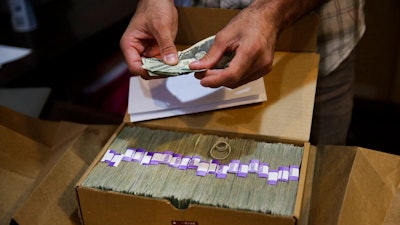
LOS ANGELES (AP) — Bank officials and others urged Congress on Wednesday to fully open the doors of the U.S. banking system to the legal marijuana industry, a change that supporters say would reduce crime risks and resolve a litany of challenges for cannabis companies, from paying taxes to getting a loan.
Most Americans live in states where marijuana is legally available in some form. But there's a problem when it comes to banks: Most don't want anything to do with money from the cannabis industry for fear it could expose them to legal trouble from the federal government, which still considers marijuana illegal.
That conflict has left many growers and sellers in the burgeoning pot industry in a legal dilemma, shutting them out of everyday financial services like opening a bank account or obtaining a credit card. It also has forced many businesses to operate only in cash — sometimes vast amounts — making them ripe targets for crime.
Banking, government and industry representatives at a House committee hearing in Washington urged lawmakers to pass a proposal that would allow pot businesses to access loans, lines of credit and other banking services, while sheltering financial institutions from prosecution for handling pot-linked money.
California Treasurer Fiona Ma, whose state is home to the nation's largest legal pot market, called the measure a critical step for the rapidly expanding industry.
Gregory S. Deckard, who spoke on behalf of the Independent Community Bankers of America, said the cloud of legal uncertainty was inhibiting access to banks while creating safety hazards for businesses.
The proposal, he said, "would offer the needed clarity" for more financial institutions to welcome the marijuana industry as customers.
But others had concerns.
Republican Rep. Blaine Luetkemeyer of Missouri said the proposal would create confusion while marijuana remains illegal at the federal level. He questioned how banks would identify criminal operators and pointed to how Congress handled hemp, the low-THC cousin of the cannabis plant, which was removed from the list of federally controlled substances.
With the banking legislation, "we are putting the cart before the horse," he said.
Legalization advocates have reason to celebrate that the hearing simply took place before the Consumer Protection and Financial Institutions Subcommittee. The proposal, or similar versions, have languished for years.
"Lawmakers are not being asked to weigh in on whether marijuana should be legal or not. They are simply looking at whether banking services should be available to these businesses in states where it is already legal," said Mason Tvert of the Marijuana Policy Project, an advocacy group.
The number of banks and credit unions willing to handle pot money is growing, but they still represent only a tiny fraction of the industry.
The hearing came just days after Oregon Sen. Ron Wyden proposed legislation that would give states a free hand to allow legal cannabis markets without the threat of federal criminal intervention. The proposal would take marijuana off the federal controlled substances list and remove federal criminal penalties for individuals and businesses acting in compliance with state marijuana laws. An identical proposal is pending in the House.






















